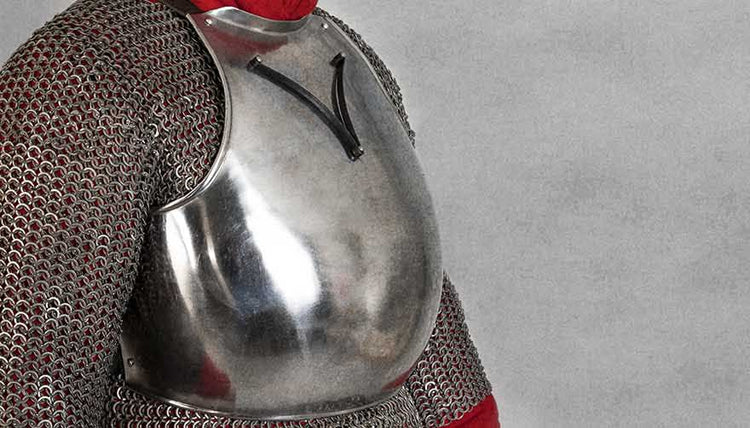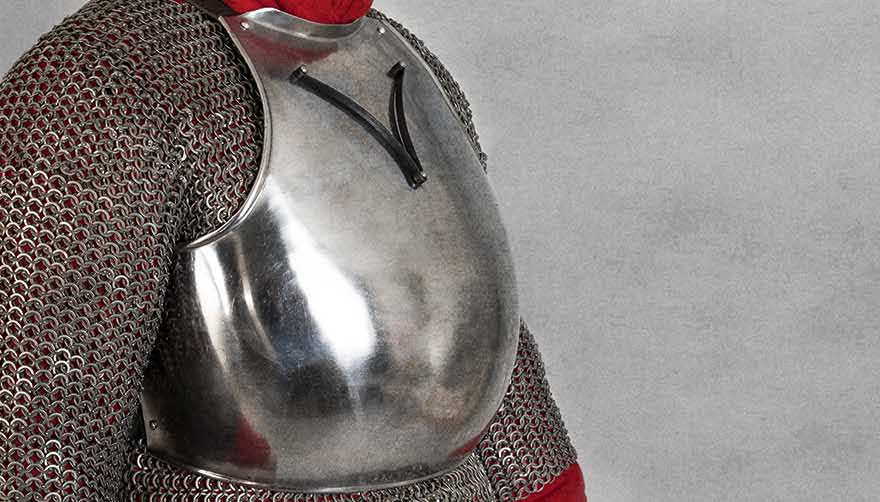Torso Coverage
In combat, body hits cause the most severe damage. The chest, abdomen, back, and pelvis house the vital organs that can cause severe pain from blows or stabs and can incapacitate or even kill the opponent with a single hit by impairing their function. It’s no small wonder that, aside from the head, it’s the part of the body that has always received the greatest attention in the development of Armour.
Every armour set known to historians today uses, so to speak, the armour of the upper body as a basis, primarily the chest and partly the back.
Worn over textile clothing, early armour pursued the goal of serving as a third, stable skin to protect the upper body from stings and cuts and absorb the energy of blunt blows and soften them by distribution. For this purpose, ancient peoples already resorted to the materials that nature provided them. Simple protection was offered by war skirts or wadding armour, made of several layers of fabric with intermediate layers, which cushioned the upper body above all and thus fortified it against blows. However, they had little to offer against cuts and, above all, stabs. By applying hard, stable materials, such as wood, tree bark, or bone, the earliest primitive armour was created.
Great progress could be achieved by the increasing innovations in processing leather as well as the production and processing of metals. In the ancient world, there was already armour in shirt form sewn with metal parts as well as the first scale armour.
Throughout the Middle Ages, textile armour was the most common method of protecting the upper body. It was affordable, though was minimally effective, even for common fighters and soldiers. The gambeson served many warriors as an independent armour piece and, depending on its quality and the financial means of its wearer used a wide variety of materials in different processing.
During the early Middle Ages, those who could afford it wore a ring armour shirt, which covered the torso to the thighs. Also, scale armour, already known from earlier times, was used at least sporadically in the Early and High Middle Ages.
Further weapon developments throughout the High Middle Ages created a demand for reinforced armour, which could be realized by the progress in metal processing. In addition to the ring armour shirt, knights, therefore, wore at the end of the High Middle Ages, for example, the brigantine, a doublet made of cloth or leather, the inside of which was inconspicuously studded with metal scales or rings
With the proliferation of plate armour in the Late Middle Ages, the massive cuirass, a suit of armour made of individual plates for the chest and back, finally gained relevance. The armoured shirt made of rings, chains, or metal plates, the cuirass lasted until the late 19th century, when it was abolished, at least in Germany, because its protective effect did little to counter firearms.
Your Torso Armour from Zeughaus
Whoever encounters your character in LARP, reenactment, or exhibition combat, the first thing they will see in your eyes is your determination. They will scan for your value as an opponent or battle companion as well as your armour. The next glance falls on your largest attack surface: your torso. Protecting it is indispensable. At the same time, it is visually the most important feature of your appearance.
With Zeughaus you will find a wide selection of armour for your torso. Scale armour, lamellar armour, or an impressive cuirass, worn over a simple robe, visually transports you to the Middle Ages. Combined with chain armour, it nearly forms a complete armour set.
If you prefer more discretion, but still want to be sure to be well equipped, the brigantine gives you the inconspicuous look, in which only the initiated recognize the protective armour.


